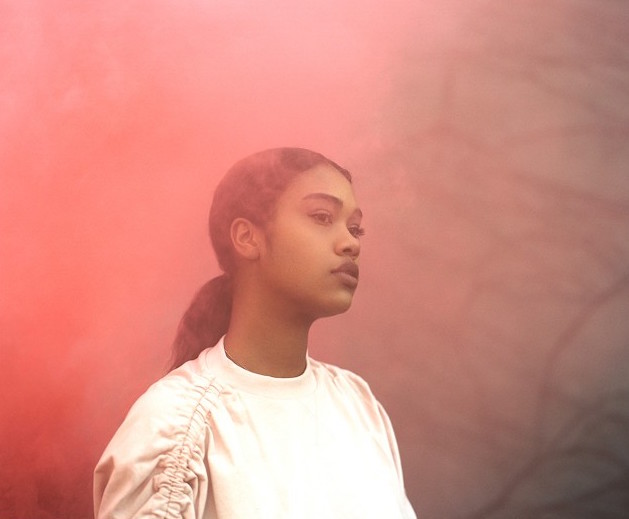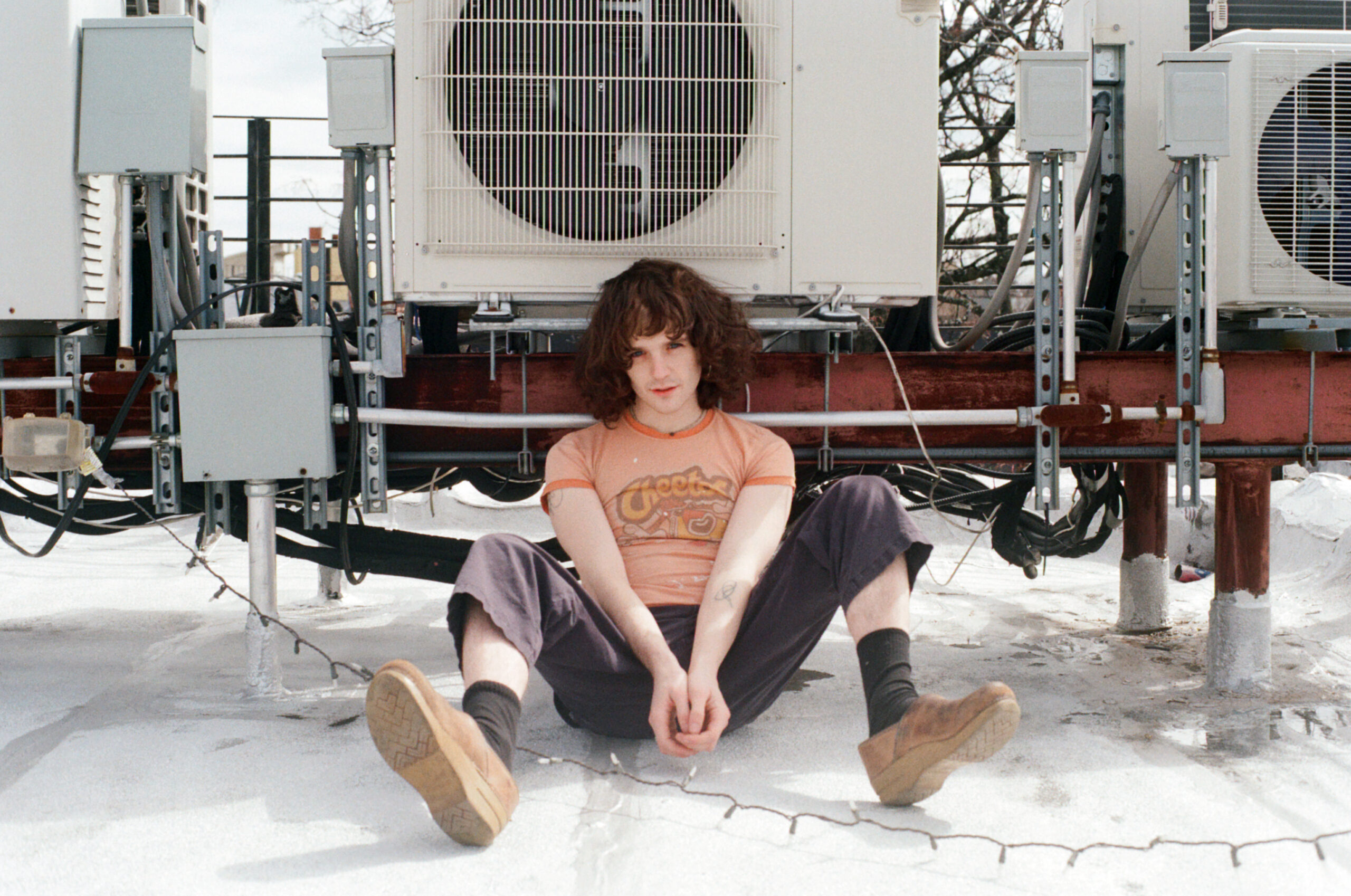When I catch Amber Mark on the phone, she is in the middle of writing a melody for her friend: “I was writing until like three in the morning and then I woke up mad early and was like, 'I can’t stop thinking about that song, I need to finish it!'”
Mark, 23, writes and produces all of her music and collaborates with dozens of fellow producers. As we speak she's in LA working with Noah Breakfast and Two Inch Punch. She began producing her own music by just messing around with GarageBand, as many curious and eager young artists do, until venturing out into the world searching for others to produce her music.
Nothing clicked, but realizing that people weren’t matching up with her artistic vision did not deter her. “The producers that I was working with at the time, a long time ago through mutual friends or whatever, it just didn’t work out. It wasn’t the right people,” Mark explains. She says she doesn’t regret those experiences. It was a learning curve that let her realize her full potential. “Once I accumulated a bunch of sounds and learned how to use Logic, I was like, 'Wait a second, I don’t need to work with any producers. I can do this on my own.'”
Less than a year ago, Mark published her first song on SoundCloud. “Space,” which makes an appearance on her debut EP 3.33am, gained a lot of buzz and caught the ear of Beats 1's Zane Lowe. Hypnotic claps lead off the single as orb-like synth effects radiate out from her vocals. “I know it is hard to comprehend, why won’t you let me be in my head," Mark sings, referring to an instance where her sister wouldn’t leave her alone. The all-too-familiar irritating sibling scenario is easy to visualize.
Mark lives in New York City with her godparents and sister. She wrote 3.33am, out today, in her bedroom, before recording it in SoHo and flying to London for its final mix. She’d find solace in New York City’s sedated nights. The title refers to Mark's nocturnal writing state. “I was living with my godparents. We all live in separate apartments but we were always in and out of each other's apartments like one big house in the city. I liked to write at night because I felt the most alone.”
Her isolation was more than just annoyance from family members. She was recovering from a reality-shattering loss. Mark remembers receiving an educational pamphlet about the stages of grief when her mother began hospice shortly before passing in 2013. None of the bulleted states matched her own. With the making of her first song "Can You Hear Me?" followed by “Space" and "Monsoon," she realized that she was developing her own steps of overcoming bereavement. There’s no correct way to lose someone, especially when you’re a young adult still shaking off teenage growing pains. It’s an enigmatic transition that we all have to experience, passing through to another understanding of life.
3.33am embodies that process of major loss, Mark honoring her mother through her own personal list of emotional checkpoints. While making music, she was exposed to the vast amount of emotional stress. She wrote out her own list of what she went through following her mom’s passing. “It was regret, anger, isolation, sadness, questioning -- like a lack of faith, questioning, Is there a god?-type feeling -- and kind of overcoming and all that stuff. Once I wrote down that list I was at that stage of, not feeling better but, like it was easier to deal with the fact that my mom was gone. That feeling of her gone was always there but it is almost easier to live with it.”
Each track that she wrote and continued to write would correspond to a feeling on the list. "Regret is called 'Regret.' Anger is 'Lose My Cool.' Isolation is 'Space.' Sadness would be the interlude into 'Monsoon' and also 'Monsoon.' 'Can You Hear Me?' is lack of faith and questioning. 'Way Back' is overcoming. It was definitely interesting to look at that list and, 'Oh wow, this is really how I dealt with it without even realizing I was going through it, until I made a list.'"
At first 3.33am does not sound like a musical eulogy, but after a few listens it begins to both hug you and rip into you. Mark's production sweeps you off onto a stranger’s dance floor before you can even realize her music is layered with a heavy emotionality. “What I really wanted to do with this EP, I didn’t want it to be really depressing. I didn’t want it to be like this sad, down EP about losing someone. I wanted it to be something that would uplift people. I think I tried to touch on more of the sadder emotions in the lyrics and to kind of uplift in the music. Cause that’s the fun part is dancing and moving around. I wanted a mixture of both.”
Mark explains that the process of making her EP was therapeutic on multiple levels. “It was a distraction as a way of being kind of having my mind on something that was active and that I was actually doing something instead of just like lying in bed sulking and crying and all that stuff, which is also healthy to get that stuff out.” It was also a form of expression, creating a form of communication with her mom that was trying to get at the real thing. “I think singing about her or singing about what I was going through with all that stuff, I kind of felt like I was talking to her, and I was letting it out even though it was almost pretty much to myself. It felt good to get it out in song and I was able to articulate what I was feeling in a better way, a way that felt more like a release.”
Mark’s music-making process begins with a feeling or notion that she’s experiencing. Her goal is to make a soundtrack to match. “When I was going through that there was so much that I had inside of me, so many emotions, it really, it was quite easy,” she says about the writing process. “I think I have a harder time writing about things that I am not actually going through.” She projects vivid scenarios and emotional color onto spectral synth beats or recorded audio bits from real life. The interlude “Journey” is a cinematic transition into the shimmering "Monsoon." “When I wrote the actual beat to it I wanted to make a soundtrack to the feeling of walking into the hospital and seeing my mother and her slowly slipping away."
"Monsoon," the fourth track on the EP, is a portrayal of Mark’s stage of sadness. It begins with a naked piano backing her breathy vocals. Rain hits the pavement in the background, taking you to India (one of her childhood homes) and a raw emotional state. The track is also one of the poignant instances where she uses her mother’s voice with past audio recordings.
“I think it was really important to add her voice to it and I am really happy that I did.” You can hear her mother’s warm German accent (her mother is from Kaiserslautern) that “feels good in the soul,” proclaiming her love for her daughter. Mark was about 12 years old in Berlin on the way to the airport to visit her godparents in New York. “She starts talking in German, she’s talking about how my godparents should learn German, and we’re basically having like a cute little joking argument about that and laughing. I thought it was a really sweet moment of our relationship.” She captures both painful and happy memories of her mother, using the interlude that precedes “Monsoon,” as well as moments at the end of the track that feature her mother in a sicker state. “When I had written and added that to that track to make the interlude, I really wanted to make sure she’s in a happier place in 'Monsoon' and then it ends on a happy memory of us together.”
Mark grew up all over the world, but spent a lot of time in India while her mother studied the tradition of Thangka painting -- a Tibetan painting practice that depicts different deities in Tibetan buddhism. Although Mark draws energy from music, her mother was an expert in the visual arts, so she incorporates her mom into her cover art. Her mother’s essence can be found in all the seams of 3.33am. “The flower border that is on the 'Monsoon' single is a border that is used from one of her paintings, and then for the EP there was a picture of her painting a wall in our New York City home in the west village from a long time ago. It was this beautiful, marigold color. I thought it went really great with the cover art that I had chosen for the EP. It’s a really funny picture of my mom. I don’t think she would be really happy if I showed the whole photo of her. She’s just had a long day of work painting and she looked a little, like, distraught.”
It’s hard to pinpoint exactly where Mark's music fits in the basic music canon. “I don’t know, you have to tell me what you think it is! My sister told me 'tribal soul' and I’m like, 'Alright, I’m gonna stick to that. I like that.'” When discussing specific artists she emphasizes personal longevity, which for her means Michael Jackson, Earth, Wind, & Fire, Sade, and A Tribe Called Quest. “They’re like the number one hip-hop group always and forever in my eyes and ears. There’s also this artist Prem Joshua who is not really well-known in the US. He's a German guy who I guess also fell in love with India and Indian musicianship and all that.” She says Joshua’s "psychedelic Indian music" had a huge impact on her new EP.
The music is built from many layers of culturally disparate instruments, from the sitar to hi-hats. Mark travelled a lot as a child, living in Berlin, India, and New York. “I didn’t want it to sound like a Bollywood movie throughout the whole track, so I definitely wanted to keep that urban or house side, I guess you could say, from Berlin as well. Personally, when I listen to songs and they almost look like two cultures joined together in a track, it sounds pretty dope to me,” Mark says.
"One of the reasons that I really wanted to use a lot of Indian-sounding stuff like that was because my mom was German but she loved India. She took my brother, he’s 10 years older than me, but she took him when he was young and then she wanted me to have some of my childhood there as well. She would always go back, and India was definitely her home. It defined who she was. I really wanted that because I was talking so much about her in the EP, in almost reminiscing on her, and trying to keep her alive through my music."
3:33am is out today on PMR/Interscope. Stream it below.






